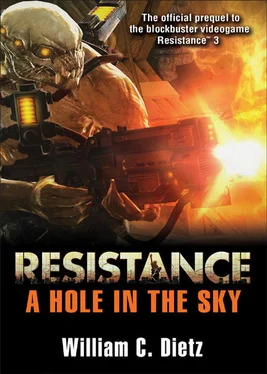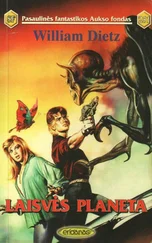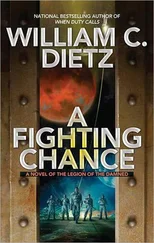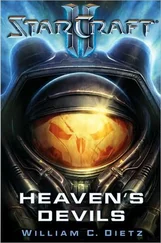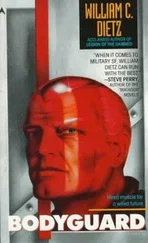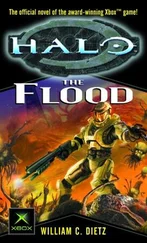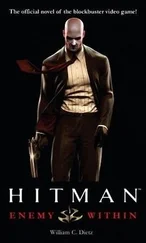William C. Dietz
RESISTANCE
A HOLE IN THE SKY
For Marjorie with all my love
I would like to thank President and CEO of Insomniac Games Ted Price, as well as Chief Creative Officer Brian Hastings, Creative Director Marcus Smith, Writer Jon Paquette, and all the rest of the folks at Insomniac Games for their help and support.
Thanks also go to Sony Computer Entertainment America Senior Producer Frank Simon and my editor, Tricia Pasternak.
Friday, July 3, 1953
New York, New York
It was 0836 in the morning, but so dark it might have been evening. Purplish clouds hung low over the snow-shrouded city as if to smother it. And when they parted, it was to allow the upper reaches of an alien structure to pass through a black-rimmed hole and touch the sky beyond. At its base, the tower wasn’t so much a symmetrical obelisk as a muscular tree trunk that had driven its angular roots down through New York’s outer crust into the subterranean flesh below.
The very sight of the brooding tower and the dim lights that glowed within served to reignite President Thomas Voss’s hatred for the Chimera. He was lying prone on the roof of a half-gutted warehouse, looking across the half-frozen Hudson River through a pair of powerful binoculars.
The top third of the Empire State Building had been sheared off, leaving an ice-encrusted stump to poke up out of the hills of drifted snow surrounding the tower. Voss knew that thousands of such structures had been excavated across the surface of the planet. All working in concert to cool Earth’s atmosphere and make it comfortable for the Chimera.
The rotten bastards , Voss thought to himself. Damn them to hell!
Although the truth was that the Chimeran forms weren’t so much individuals as functionaries. All controlled by a hive-mind that was better described as an “it” rather than a “them.”
But the hive-mind could manifest itself in more than a dozen different forms. It landed in Russia, and then exploded out of that country in 1949 and overran Europe. The luckiest humans died. The less fortunate succumbed to the alien virus and were transformed into Chimera.
Within a year most of Europe had fallen, leaving only Great Britain to carry on. But after a desperate struggle, England fell as well, and the Chimera attacked America in 1952. American towns and cities were overrun, and millions of citizens were transformed into monstrosities. And, with the exception of a top-secret organization called SRPA (Special Research Projects Administration), the government had been slow to react. Voss, then Assistant Secretary of the Interior, admitted as much. The result was a vast Chimeran-dominated wasteland that stretched from coast to coast and from Canada to Mexico.
They could not conduct a census, or do any of the other things governments were supposed to do, but Voss and his staff estimated that most of the country’s 160 million citizens had been killed by the Chimera, rampant disease, or starvation. The 10 million or so people who remained were hiding from alien hunter-killer teams and trying to eke out whatever sort of living they could.
But if Voss and a force of volunteers could enter New York and destroy the Chimeran tower, the victory would not only slow the systematic effort to cool the planet’s atmosphere, it would send a message of hope to the citizens of the United States. And cement his position as President, a responsibility Voss had assumed after the VTOL (vertical takeoff and landing aircraft) carrying President McCullen and the surviving members of his cabinet had been shot down.
An Army general assumed the presidency after that. He was subsequently killed by a Titan at the battle of Phoenix, leaving the nation rudderless until Voss stepped forward. “So, Marvin,” Voss said as he lowered his glasses. “What do you think?”
Rather than scan the New York skyline, Captain Marvin Kawecki’s binoculars were focused on the problem immediately in front of them and off to the left. And that was the approach to the Holland Tunnel. Kawecki had a shock of dark hair, squinty eyes, and a weather-seamed face. “I can see half a dozen Hybrids. All of them are inside the central toll station. I think Chu could nail half of them—but we’ll need a second sniper to get all six. Can you handle that, Mr. President?”
“I’ll sure as hell try,” Voss said as he secured his binoculars. “Let’s go down and take them out.”
Kawecki thumbed his mike. Like most members of the team, he wore fingerless knit gloves. “We’re pulling out. Lang, find a path to the brick building that fronts the toll plaza. We’ll clear the center booth from there. Over.”
The other soldiers, all of whom had been providing security up until then, seemed to materialize out of nowhere. All were veterans, experts at urban warfare, and had accompanied Voss on the long three-month journey from Freedom Base in the Ozark National Forest.
There had once been sixteen troopers, but a long series of battles had taken their toll. The remaining soldiers were dressed in whatever manner they preferred and armed with a wild variety of human and Chimeran weaponry. No orders were given, nor were any required as a man named Lang took the point position. He had a long, lugubrious face and the manner of an undertaker. Kawecki was next, followed by Voss, Private Mason, Corporal Rigg, Private Venley, Private Chu, and Sergeant Alvarez, the last having been promoted to second-in-command when Lieutenant Hopper took a projectile between the eyes just east of Louisville.
Lang led them around a large hole and down three flights of switchbacking stairs to the ground floor, where he paused just inside a shattered doorway. The Chimera were called “stinks” for a reason, and Lang had an extremely acute sense of smell. Just one of the reasons why he was on point.
Once he was sure it was safe, Lang slipped out through the door, took a left, and made his way down a sloping passageway. From there he led them through a half-burned factory to a door on the north side. Waving the rest of the men into cover, he went forward alone.
Voss and the others could do nothing but wait as Lang crossed an alley and disappeared into the one-story brick building fronting the toll plaza. Finally, his voice hushed, the scout invited the snipers to join him.
Chu had the sharpest eye on the team. But Voss was pretty good too, and proud to have been chosen for such an important task. Because he knew that the title “President” didn’t mean very much to the men around him. Not anymore. Their respect had to be earned.
After entering through the back door, the men made their way past a row of looted offices and into the lobby beyond. Lang was waiting for them. He pointed to the shattered windows that bracketed the front door and looked out onto the toll plaza. Voss chose the window on the left, Chu took the right, and Lang turned his back on both of them in order to watch the back entrance.
Chu was armed with a scope-mounted government-issue L23 Fareye. Without a sniper’s rifle of his own, Voss had to rely on his carbine. Though equipped with an open sight, in the right hands the weapon was very accurate and capable of firing a lot of rounds in a short period of time. Voss thumbed the safety off, eyed the toll booth, and saw the stinks lurking inside. In a perverse sort of way, their presence was a good sign. Because there was no reason to guard a tunnel that was closed. Voss kept his voice low. “I’ll break the glass and wait for you to take two of them out. Then I’ll hose the rest of the bastards down.”
Читать дальше
